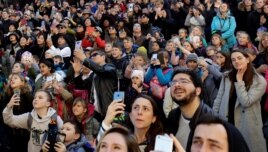19 November, 2019
Nearly 8 million people visited the Czech capital of Prague last year, making it one of the most visited cities in Europe.
Many visitors walk through the old city and take pictures in the Old Town Square. Prague has become wealthy from the money tourists spend.
But now, 30 years since the Velvet Revolution ended Communist rule, not everyone is happy with all the change.
Filmmaker Pavel Kacirek has an apartment home in the heart of Prague. Kacirek says he loves the city, but thinks it is no longer an enjoyable place to live.
"People have moved away, so services, shops...restaurants have gone with them," he said.
"The monuments are here... But it is really a Disneyland decoration," he added.
One of the biggest problems for Prague's 1.3 million people is housing. Prices are high.
Some apartment buildings no longer serve as homes for the city's residents. Many apartments are now used as offices or housing for short-term visitors.
Airbnb listed nearly 12,000 apartments in Prague last year, reports Prague's development institute IPR. The city center area has lost nearly 50 percent of its residents. In 2017, the number of registered voters totaled 21,556, down from 36,862 in 1990.
Tourists now fill Prague's historic streets. Many stay up late into the night, buying cheap beer from bars and restaurants.
"The tourist numbers are certainly greater than Prague can bear," said the city's mayor, Zdenek Hrib. He added that Prague was trying to bring in higher-spending visitors, including those coming for business meetings.
"We are trying to resolve the Disneyland that is evolving here," he told the Reuters news agency.

Tourists watch the Astronomical Clock at the Old Town Square in Prague, Czech Republic, November 7, 2019. (REUTERS/David W Cerny )
Profits and problems
When Communism ended in 1989, Prague was an untouched, historic city of great beauty, but it had problems with air pollution and few services. Many old buildings were in need of repair.
Billions of dollars of investment and tourism spending have changed Prague into the wealthiest area in Central and Eastern Europe. It has a gross domestic product per person of 187 percent of the European Union average, the European Statistical System reported in 2018.
But Prague has changed over the past 30 years. The main tourist areas are now filled with souvenir shops, money exchanges and drinking establishments.
"It is about how Prague positions itself. If we remain a cheap bar, there will be slops," said architect Kristof Hanzlik. He lives at his family's 17th century home, near the walls of the Prague Castle gardens.
The city has made efforts to solve the problem. It now has a "night mayor" who has the power to take action against people making loud noises late at night.
Officials have also removed several money exchanges that charged high rates. They plan to stop renting office space to souvenir shops and bring back services for city residents. It is barring sales of cheap beer to younger tourists from bicycles.
But for now, many Czechs just avoid the center of Prague and recall its formerly uncrowded beauty.
I'm Susan Shand.
The Reuters News Agency reported this story. Susan Shand adapted it for VOA Learning English. George Grow was the editor.
Write to us in the Comments Section or on 51VOA.COM.
_________________________________________________________________
Words in This Story
evolve – v. to change or develop slowly often into a better or more complex state
data – n. facts or information used usually to estimate or plan something
souvenir – n. something that is kept to help one remember a place you have visited
gross domestic product – n. the total value of goods produced and services provided in a country during one year
cheap – adj. something that does not cost a lot of money
slops – n. food that is fed to pigs and other animals
monument – n. a building or other structure set up in honor of a famous person or event
decoration – n. the activity of making something look more appealing